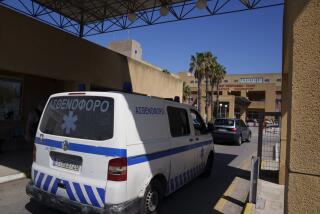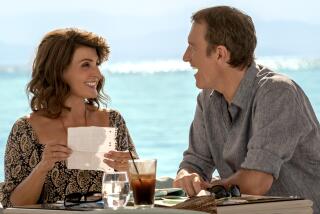The Greek Isle That Time Forgot
LIPSI, Greece — I’m sitting on a boat dock looking at Greece, circa 1950. Jackie Kennedy hasn’t started dating any Greek shipping tycoons. Few beyond the Aegean Sea have ever heard of ouzo. From where I sit, it doesn’t even seem Zeus has been gone that long.
Outside a tiny one-room taverna called an ouzeria, I’ve joined old men sipping the potent licorice-flavored drink in the brilliant sun. We watch a half-dozen fishermen on pastel-painted boats dragging in lines from an Aegean that’s almost as blue as the cloudless sky.
The sun-washed docks are devoid of wall-to-wall restaurants. The lone souvenir shop is closed for the week. Next door, one of the best hotels here is charging 18 euros (about $17) a night. I hear birds chirping, smell the wonderful salty aroma of feta cheese from the tables around me and listen to the sea lap against the boats. This is Lipsi, the Greek island mass tourism forgot. So far.
If you’re looking for Lipsi on a map, find a good one. It’s not on many. It’s a tiny speck of rolling farmland and isolated beaches 40 miles off Turkey. It’s part of the Dodecanese island chain, where overdeveloped Samos to the north and Patmos to the west have started to resemble Greek theme parks. Lipsi is barely big enough to hold a park. It’s only 12 square miles, with 650 people and twice as many goats. Besides the one bus and two taxis on the island, a main mode of transport remains the donkey. The one bank is a cash machine. There are one doctor and one nurse. There are 45 churches.
Lipsi does, however, have a dozen beaches on seemingly perfect bays. Its 150 guest rooms are booked up only in July and August. Nine good restaurants offer inexpensive, traditional Greek cuisine. Don’t bother with dinner reservations. Lipsi gets only about 10,000 tourists a year. Mykonos, Greece’s most popular island, gets about 180,000.
And don’t come here for history. There are no ruins. The lone museum, featuring holy water from around the world, is open only two hours a day.
Really, there is nothing to do here but lie on the beach, eat and watch the world go by--slowly.
One day, a car ferry the size of New Hampshire pulled in way down the dock, the only place in the harbor deep enough to hold anything more than a fishing boat. The ferry comes in twice weekly from Piraeus, the port of Athens, and disgorges tourists all over the outer islands.
“How many tourists did you see get off?” asked Lipsi resident Sarah Vavoulas. The giant door opened, and not even a lime rolled out.
Vavoulas, a native of Brighton, England, came to Lipsi 14 years ago, met future husband Haralabos Vavoulas and never left. Today they own the Rock, a beautiful, popular late-night ouzeria overlooking the harbor. During the day it’s a great perch for watching an island in no hurry to go anywhere fast. “I lived in London before I came here,” she said. “People live for tomorrow in big cities. They never live for the moment. Here no one plans ahead.”
I had visited Greece three times and never heard of Lipsi. I discovered it on an Internet travelers’ message board and became intrigued after research revealed little but a few key repetitive words: “traditional,” “isolated beaches,” “quiet.” On the Greek island circuit, Lipsi is way out in right field.
Unlike Santorini, Mykonos and other islands smothered by tourism, there are no straight shots to Lipsi. There isn’t anything close to an airport. To reach it, I flew to Athens and caught an Olympic Airlines shuttle to Samos. A $5 taxi took me to the harbor, where 90 minutes later a Flying Dolphin, one of the sleek hydrofoils that started darting around the Greek islands 10 years ago, took me to Patmos in an hour. Without changing boats, I was on Lipsi in 20 more minutes.
A bevy of locals greeted me at the dock, all holding signs with pictures of available rooms. I quickly agreed to a price of $17 with bath, and a 30-ish, curly-haired man named Stephanos took me in his pickup down the harbor and up through the tiny village. We drove past burros and donkeys on a path just wide enough for his truck. Two women carrying baskets of bread chatted outside a bakery. Greek folk music emanated from an open window where a woman in traditional black sat in the shade. This place is an outtake from “Zorba the Greek.”
“This is Lipsi town,” Stephanos said. “Exciting, isn’t it?”
It was perfect.
My spacious double room at Studios Anna was spotless and furnished with a refrigerator, hot plate, writing table and big closet. A balcony overlooked farmlands scattered with the snow-white buildings and turquoise roofs of Greek Orthodox churches. Stray kittens played in the garden below. I stood on the balcony, lined with pink bougainvilleas, and took in the fresh salt air and enchanting sounds of rural Greece. “That’s a dove cooing in your ear,” said an American two balconies down.
Frank Buzzoni, a retired federal air-traffic controller from Bluemont, Va., and his wife, Diana, have visited Greece regularly for 20 years. They’re one of a handful of “Lipsites,” Western travelers who use this little rock as their secret getaway. As a potential new member of the club, I was told I’d be hooked in a hurry.
“We’ve been all over Greece, and Lipsi and Patmos are our two favorites,” he said. “It is so quiet here.”
Walking through every street of the charming village took all of 10 minutes. A walk to the farthest beach took half an hour. The village is up a cobblestone path above the central church that is Lipsi’s lone landmark. The path leads to quaint outdoor restaurants encircling a tiny town square. There’s a tourist information office that isn’t open much.
Narrow paths snake out from the square past small, dark bakeries, fresh vegetable stands and cozy tavernas where a fresh Greek salad, souvlaki, fries and an after-dinner Metaxa brandy may cost 10 euros (about $9.40). Another path leads under a huge tree that provides shade for a guest house overlooking the harbor. In a restaurant called the Vault, the menu shows a picture of Lipsi from 1912, during Italian occupation. It doesn’t look much different now.
“A lot of Greek people don’t know about it,” said Michael Krabousanos, a Lipsi native who lived in Cincinnati for 35 years. “When I’m in Athens and I tell them where I’m from, they go, ‘Where’s that?’ ”
It’s true. Greece has a TV show similar to “Jeopardy” in which learned guests answer questions from all fields. One recent question: To what island chain does Lipsi belong? It stumped the panel.
They obviously didn’t know about Lipsi’s quiet traditions either: the two-day-long weddings where locals break plates (well, actually they’re plastic) at dancers’ feet in the town square, the three-day wine festival in August, the neighborhood dinner parties nearly every night.
On Lipsi, people regularly stopped me to provide rides to the beach. The owner of one village square restaurant let me help myself to drinks in the cooler while watching the World Cup with his family and friends. Just leave the euro on the table, he said. My local bakery added freebie sesame bread sticks with my daily breakfast order of tiropita, Greece’s delicious cheese pie.
“I find it just cozy,” said Evert Kerkerk, a Dutch yacht builder who has sailed the Greek islands for 10 years and returns to Lipsi for seven months every year. “You become part of the island. You meet each other sometimes three or four times a day. Hello, here. Hello, there. If you are a tourist here, you are not alone.”
There’s one place on Lipsi where you can feel very alone: the beach. Beaches here, like ouzo, are an acquired taste. The downside of undeveloped beaches is that they are, well, undeveloped. Don’t expect lounge chairs. There isn’t the sugary white sand with the consistency you’d find off the 18th green at Riviera Country Club.
A 20-minute walk from the village and a five-minute trot down a goat path brought me to Hohlakoura, one of Lipsi’s best-known beaches. On an early June day, the scenery was breathtaking: a perfect half-moon bay formed by long rock jetties. The royal blue water was as clear as glass and almost as smooth. It was 80 degrees, under a cloudless sky, and a nice, cool breeze came off the Aegean. Not a soul was on the beach. I tried to find a plot of sand on which to lay my straw mat and found none. The beach was rocks. Big rocks. Small rocks. I put down my mat and carefully lay down. When the rocks are even, they form a surprisingly comfortable surface. Then again, an Indian fakir feels the same sensation on a bed of nails.
“I’m glad they don’t have sandy beaches,” Buzzoni said. “This place would be just like Mykonos or Santorini. It’d be a madhouse.”
Actually, Lipsi does have sandy beaches. You just have to know where.
The most comfortable beach on the island may be the town beach. Liendou, just around the jetty from the harbor, features hard-packed sand on its own tree-lined bay. Hotel Aphrodite, one of the two nicest hotels on Lipsi, overlooks it from across the narrow road. Elsewhere, a half-hour walk along spectacular coastline leads to Platis Yialos, which has a shallow, sandy bay. A 10-minute walk north of Hohlakoura is another picturesque sandy beach called Tourkomnima.
Lipsi is lucky it has those. Because it has no islands directly north of it, except Samos 50 miles away, Lipsi is susceptible to the Aegean winds that wash rocks from the sea onto the beach. The plus side: The wind ensures the island is never uncomfortably hot. The other plus is that the beaches are just rough enough to keep away the cruise ships that invade Patmos twice a week. The island is changing nonetheless. Forty tourist bungalows are to be completed in 2004. It’s not exactly urban sprawl. Then again, this is an island that didn’t have a paved road until 1995. Ten years ago, agriculture, fishing and farming were more dominant. Now locals are slowly turning toward tourism.
“If we’re united, this could be another Bahamas,” said Nico Christodoulou, a Lipsi native who owns the guest house Studios Kalymnos. “There are so many little islands. But there are conflicts. People might just sell the land. They think it’s better with money in hand.”
John Henderson is a freelance writer based in Rome.
More to Read
Sign up for The Wild
We’ll help you find the best places to hike, bike and run, as well as the perfect silent spots for meditation and yoga.
You may occasionally receive promotional content from the Los Angeles Times.






